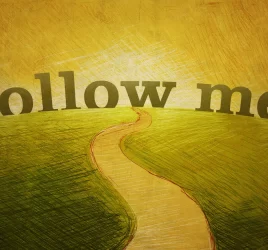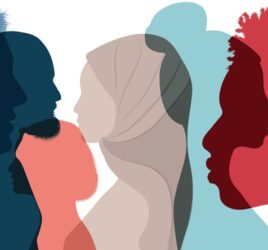
The Holiday Season is Here … How Can I Navigate It?
We have just entered a season of non-stop celebrations: Halloween, Thanksgiving, Christmas Eve & Christmas Day, New Year’s Eve, and New Year’s Day… yeah, that’s a lot! So, I’ve decided to share some of my personal reflections on these holidays and their impact on our lives and our societies.
I am from a French Catholic cultural background. Growing up in the sixties and seventies, we would only go to church whenever big celebrations were taking place, like Easter and Christmas. I did not understand the real meaning of these events at this season of my life, but I loved going to these special masses and enjoyed something that was obviously an important part of my culture.
Those celebrations were really appealing to children like me. They had been customized by society to grasp our attention in amazing ways: Easter brought chocolate rabbits, hens, or bells … there was a treasure hunt to find them in our family backyard, where our parents had hidden them. What an adventure!
Christmas, brought lots of gifts to the foot of the nicely decorated family tree. There was nothing better than that early morning joy, waking-up with the expectation that an old man with a red mantle had supposedly brought gifts during the night for me. Year after year I opened them with an unmatched excitement. Jesus wasn’t entirely forgotten from the celebration, he had room during the midnight mass on the 24th, but nothing compared to the joy Santa would bring to us on the morning of the 25th.
Obviously, deep spiritual meaning was lost within those cultural events, more and more designed to increase sales and consumption, rather than an understanding of God’s love for humanity.
Nowadays, wherever we are, almost everywhere around the globe, societies of many different cultural and religious backgrounds have surprisingly adopted one, or more, of those holidays, as cultural celebrations of their own. They have become occasions to celebrate and just have fun with family and friends. Occasions to buy gifts, share food and all kinds of things helping their country’s economy to thrive.
In France, and most of Europe, no one has ever decided to promote Thanksgiving. I wonder why? Surely because the pilgrims reaching North-America had left the old continent and its constant wars … so nope, no thanking God for their departure! But interestingly enough, almost every country has recently adopted Halloween … another kind of celebration where again, kids are the central target, but here to celebrate death and evil spirits. And again the same phenomenon takes place: people not realizing what they’re really celebrating, just focusing on friends, gifts, and good meals shared as a cultural event.
Should we complain about this evolution? Yes, there are many reasons to do so. There is so much confusion about the deep meaning of those events. So many people mislead.
I still remember very clearly a Christmas day in Luang Prabang, Northern Laos, when a Buddhist-Animist friend of mine, came to me and carefully asked me « if we were celebrating the birth of our God? »
I was so happy about such an opportunity to share the message of the Savior’s birth! But as soon as I answered him yes, he asked me another question that immediately put me in a difficult position. He said: « So, your god is this old fat man with a red mantle, and a white beard, right? » I knew he was genuinely asking to understand our culture. It took me a lot of explaining to tell him that no, he wasn’t our god, even if he looked like one to him, but just an old Germanic tradition revisited by an American soda brand, not allowed for sale in his country. Barely convinced and surely puzzled, he asked me one last question: « OK, but you are also worshipping the spirit of the tree, right? Because you put garlands, lights and you bring gifts at its feet…? » It was painful for me to try to justify the fact that no, again, we weren’t worshipping the Christmas tree (exactly as he did with trees, rocks, rivers… as an animist).
He was completely confused, and didn’t understand why the celebration of our God’s birth was mixed in with incomprehensible other traditions parasitizing it. And you know what? I was too. That year, Rachel and I decided that from now on, every Christmas, we would do our best to clarify its real meaning to anyone participating in it with us.
And this is the point I want to bring here: Yes, there are many reasons to regret such an evolution, but let’s not stay there. In a world that doesn’t know much anymore about real christianity, let’s use those celebrations, including Halloween, as an opportunity to re-establish the truth!
Because they are now first of all mercantile events, let’s use this as an opportunity given by God to expose them to His love!
Let’s tell them the difference between darkness and the light of our God, between evil spirits and the Holy Spirit during Halloween! (which is a celebration I really don’t like ;-))
Let’s explain why two North American nations give thanks to their God, and why it is important to practice thanksgiving, not just one single day a year, but everyday that God gives us to live!
Let’s declare that beyond the gifts at Christmas, yes, there is the birth of the Savior, even if we don’t know the real time of His birth which is not what matters the most.
Let’s proclaim that Easter isn’t just about chocolates nor bells coming from Rome, but about the death and resurrection of the only Savior given by God to humanity.
Thanks to the globalization of our world, people from all cultural and religious backgrounds are nowadays associating themselves with these celebrations, just for their fun, and because they aren’t religious celebrations anymore. So, why not use this turn of events to bring back their true meaning?
Let’s turn what the evil one’s done to bring confusion into a weapon of mass evangelization!
Many Blessings to all of you in this season in Our Savior’s love.
Eric Vincent Dufour



